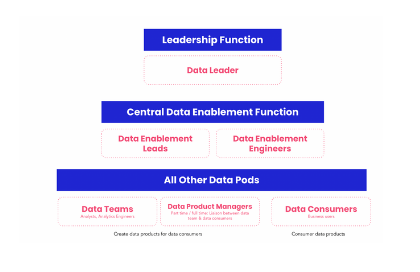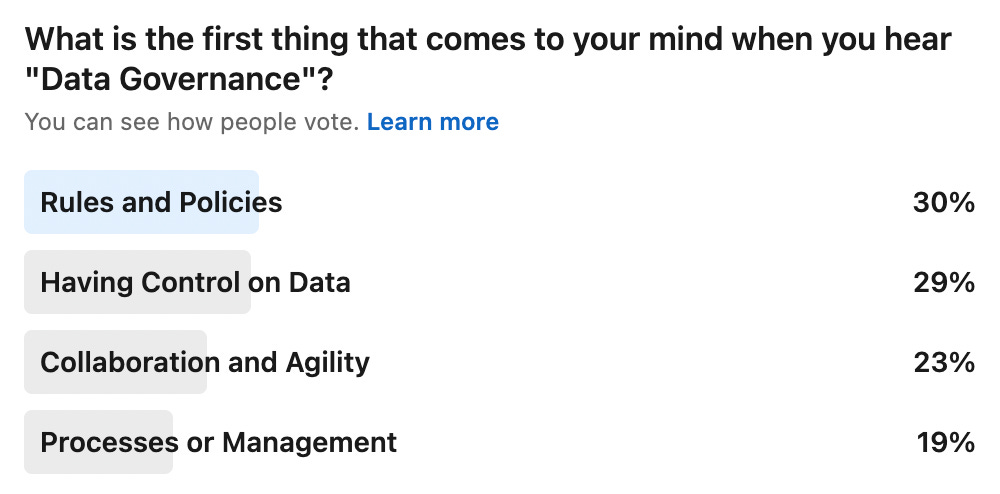Goodbye data governance, hello data enablement 👋
The top-down era of “here’s how you need to think about definitions” doesn't exist anymore.
Welcome to this week's edition of the ✨ Metadata Weekly ✨ newsletter.
Every week I bring you my recommended reads and share my (meta?) thoughts on everything metadata! ✨ If you’re new here, subscribe to the newsletter and get the latest from the world of metadata and the modern data stack.
💫 Leading with Data Governance Enablement
I’ll admit, while LinkedIn polls are not the most reliable sources, this poll shows the reality of how data governance has been perceived by data teams recently.
Control. Rules. Policies. Restrictions. Bureaucratic process. But at its heart, data governance is all about collaboration. It’s about helping data teams work better together.
The top-down era of “here’s how you need to think about definitions” doesn’t exist anymore. Industry-wide, there’s a moment of redemption for data governance. For the first time, the need for governance is being felt bottom-up by practitioners, instead of being enforced top-down due to regulation. From an after-thought, it’s becoming a core part of daily workflows.
✨ Call for “Data Enablement”✨
Data as a function is fundamentally different from other functions inside any organization. It has very diverse people (analysts, engineers, data scientists) collaborating to build something. There is also diversity in the tools and technology preferences of each of these individuals.
Yet data teams have A LOT to learn from other teams inside – from Sales Enablement & SalesOps, Manufacturing and Supply Chain, Product & Design. I’ve been personally interested in the “developer productivity engineering” movement in the software engineering world, with companies like Netflix building out entire Developer Productivity Engineering teams. Similar to this, sales teams now have a sales enablement function focused on helping the team improve productivity and equipping them with resources (or processes) to collaborate better with other functions such as product or marketing.
A version of that in the data world: a data enablement function focused on automation, team productivity, and supporting the data-adjacent roles and functions inside a company. Maybe it could look something like this? 👇
Data Enablement enables the rest of the organization to become data-driven. This function doesn’t actually execute data or analytics projects. Instead, it focuses on the tools, processes, and culture that will make the rest of the organization more data-driven.
I believe that over time, we’ll see more companies invest in a central data enablement function.
I recently spoke with Tim Wilson, Michael Helbling, and Moe Kiss on data enablement and the modern data culture stack for Analytics Power Hour.
🤝 /slack: Data Context where you need it
During a recent conversation on Analytics Anonymous with Valentin Umbach, David Jayatillake talked about, well… my favorite topic. Metadata and how making it available to the "main" data can unlock a lot of value for data teams.
“…engineering generates a lot of metadata, much more than we've ever had. But it still lacks context, because it is quite purely engineering metadata at the moment…. if you want to know something… you'd go and walk up to the data owner and ask them a question. And they get asked the same question over and over again. And it's wasteful, you know… that conversation should be codified somewhere, I feel like that should be in a metadata management platform…
I could imagine a really nice workflow on Slack where you do slash, you know, metadata tool name. And it comes up with well… here's all the stuff in the catalog that we've got, what have we got stored against it, in terms of information… or this is the thread that I need to ask a bit more information on someone's already asked a question. I have a related question. I'm going to join that thread, add extra information, extra questions that I want to ask, and get the information from the data in, or I've got a new question entirely. But when that happens, it's it gets codified, because it's, it goes back and forth between the medium by which you asked the question and the platform, which manages the metadata.”
🪄 I love when amazing data leaders dream up a feature, and our product team at Atlan has already made it come true. Check out our Slack bot that brings context from the entire data ecosystem directly to consumers, directly in Slack! DJ, this one’s for you 💙
ICYMI, I wrote more about some great end-user flows like this in my article on the Future of Data Catalogs.
📚 More from my reading list
Data Conversations by Dan Barrett
The Economics of Data Businesses by Abraham Thomas
Data for Product Managers by Arnaud Dessein
Thinking About Failure in Data Analysis by Roger Peng
Causal Design Patterns for Data Analysts by Emily Riederer
I’ve also added some more resources to my data stack reading list. If you haven’t checked out the list yet, you can find and bookmark it here.
💡 What’s next for data governance?
Well… as I mentioned, we have figured out that there’s something quite not right about data governance. Data governance programs continue to fail! There is a lack of adoption within data teams and a function that was designed for collaboration… feels like a lot about control.
Many believe that the key to solving this is better tooling or technology. But I believe we need foundational change. This shift from top-down regulation to bottom-up adoption is an opportunity for us to finally get it right.
I think it is time for Data Governance 3.0: Context, not control.
I am excited to be speaking about this with Donna Burbank, April Reeve, and Ronald Zurawski at this year’s Data Governance & Information Quality Conference on June 6.
If you’re around San Diego, come drop by. :)
See you next week!
P.S. Liked reading this edition of the newsletter? I would LOVE it if you could take a moment and share it with your friends on social.







